Business Ethics and Global Perspective: A Homework Assignment
VerifiedAdded on 2020/04/15
|6
|1227
|92
Homework Assignment
AI Summary
This homework assignment delves into the core concepts of business ethics and global perspectives. It begins by defining the term "professional" and contrasting its everyday usage with its specialized meaning, as applied in the context of business. The assignment then explores examples of professionals and those who may be referred to as such but do not meet the specified criteria. It examines the moral obligations that professionals have due to their specialized knowledge and the societal trust placed in them. The assignment further discusses the concept of a dilemma, providing an example and clarifying what constitutes informed consent in a business setting. It explores situations where informed consent might not be valid in the workplace and concludes by outlining the purpose of ethics in decision-making and accountability. References to academic sources are included to support the answers provided.
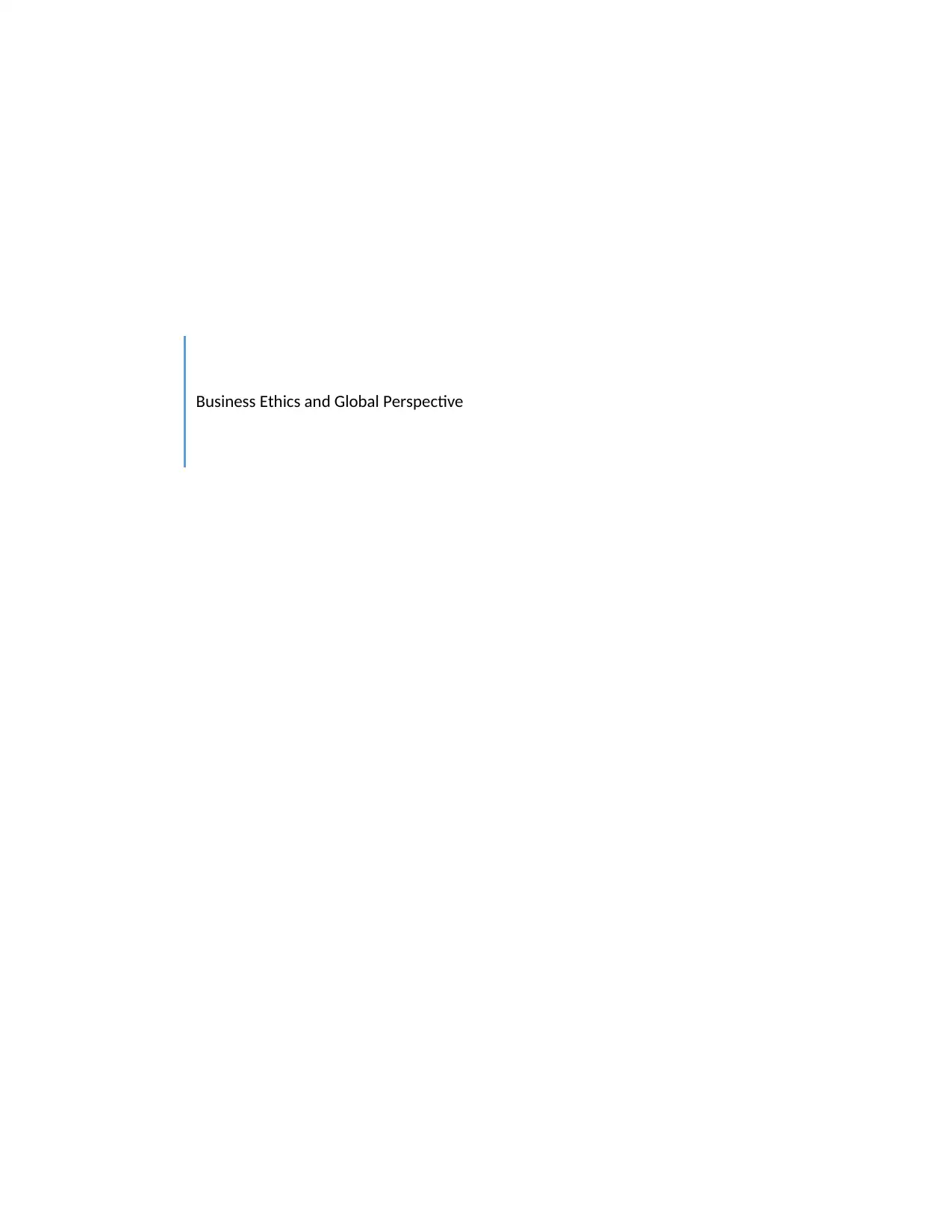
Business Ethics and Global Perspective
Paraphrase This Document
Need a fresh take? Get an instant paraphrase of this document with our AI Paraphraser
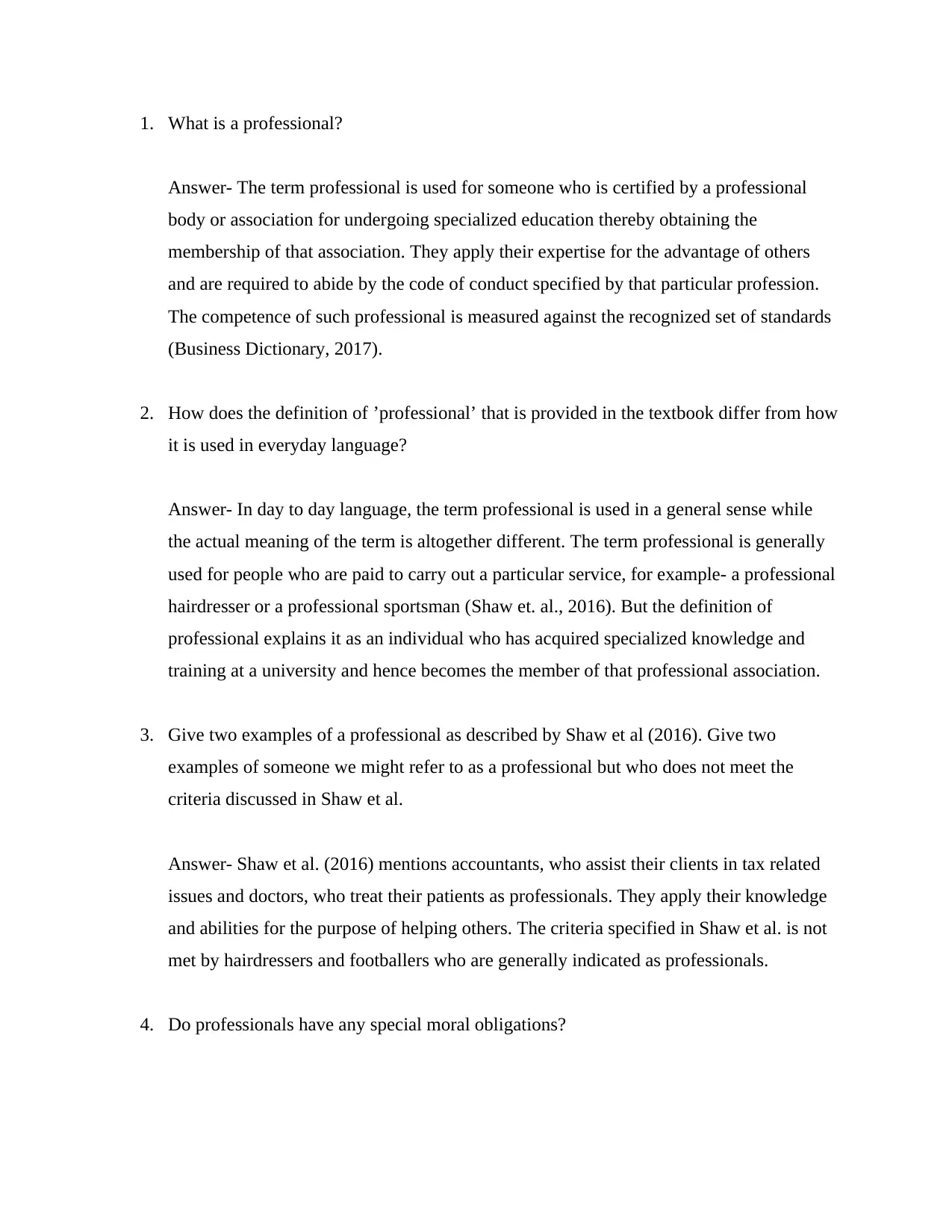
1. What is a professional?
Answer- The term professional is used for someone who is certified by a professional
body or association for undergoing specialized education thereby obtaining the
membership of that association. They apply their expertise for the advantage of others
and are required to abide by the code of conduct specified by that particular profession.
The competence of such professional is measured against the recognized set of standards
(Business Dictionary, 2017).
2. How does the definition of ’professional’ that is provided in the textbook differ from how
it is used in everyday language?
Answer- In day to day language, the term professional is used in a general sense while
the actual meaning of the term is altogether different. The term professional is generally
used for people who are paid to carry out a particular service, for example- a professional
hairdresser or a professional sportsman (Shaw et. al., 2016). But the definition of
professional explains it as an individual who has acquired specialized knowledge and
training at a university and hence becomes the member of that professional association.
3. Give two examples of a professional as described by Shaw et al (2016). Give two
examples of someone we might refer to as a professional but who does not meet the
criteria discussed in Shaw et al.
Answer- Shaw et al. (2016) mentions accountants, who assist their clients in tax related
issues and doctors, who treat their patients as professionals. They apply their knowledge
and abilities for the purpose of helping others. The criteria specified in Shaw et al. is not
met by hairdressers and footballers who are generally indicated as professionals.
4. Do professionals have any special moral obligations?
Answer- The term professional is used for someone who is certified by a professional
body or association for undergoing specialized education thereby obtaining the
membership of that association. They apply their expertise for the advantage of others
and are required to abide by the code of conduct specified by that particular profession.
The competence of such professional is measured against the recognized set of standards
(Business Dictionary, 2017).
2. How does the definition of ’professional’ that is provided in the textbook differ from how
it is used in everyday language?
Answer- In day to day language, the term professional is used in a general sense while
the actual meaning of the term is altogether different. The term professional is generally
used for people who are paid to carry out a particular service, for example- a professional
hairdresser or a professional sportsman (Shaw et. al., 2016). But the definition of
professional explains it as an individual who has acquired specialized knowledge and
training at a university and hence becomes the member of that professional association.
3. Give two examples of a professional as described by Shaw et al (2016). Give two
examples of someone we might refer to as a professional but who does not meet the
criteria discussed in Shaw et al.
Answer- Shaw et al. (2016) mentions accountants, who assist their clients in tax related
issues and doctors, who treat their patients as professionals. They apply their knowledge
and abilities for the purpose of helping others. The criteria specified in Shaw et al. is not
met by hairdressers and footballers who are generally indicated as professionals.
4. Do professionals have any special moral obligations?
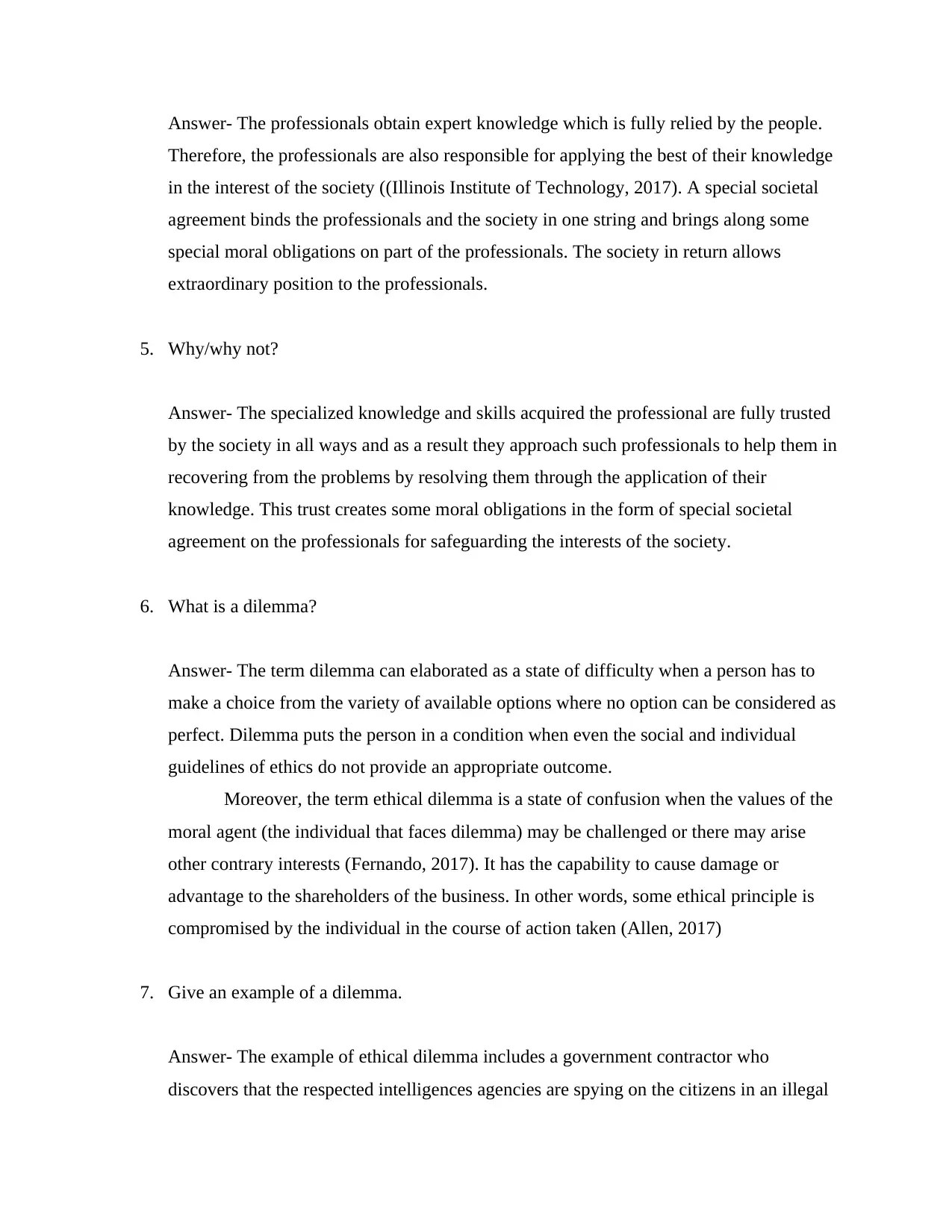
Answer- The professionals obtain expert knowledge which is fully relied by the people.
Therefore, the professionals are also responsible for applying the best of their knowledge
in the interest of the society ((Illinois Institute of Technology, 2017). A special societal
agreement binds the professionals and the society in one string and brings along some
special moral obligations on part of the professionals. The society in return allows
extraordinary position to the professionals.
5. Why/why not?
Answer- The specialized knowledge and skills acquired the professional are fully trusted
by the society in all ways and as a result they approach such professionals to help them in
recovering from the problems by resolving them through the application of their
knowledge. This trust creates some moral obligations in the form of special societal
agreement on the professionals for safeguarding the interests of the society.
6. What is a dilemma?
Answer- The term dilemma can elaborated as a state of difficulty when a person has to
make a choice from the variety of available options where no option can be considered as
perfect. Dilemma puts the person in a condition when even the social and individual
guidelines of ethics do not provide an appropriate outcome.
Moreover, the term ethical dilemma is a state of confusion when the values of the
moral agent (the individual that faces dilemma) may be challenged or there may arise
other contrary interests (Fernando, 2017). It has the capability to cause damage or
advantage to the shareholders of the business. In other words, some ethical principle is
compromised by the individual in the course of action taken (Allen, 2017)
7. Give an example of a dilemma.
Answer- The example of ethical dilemma includes a government contractor who
discovers that the respected intelligences agencies are spying on the citizens in an illegal
Therefore, the professionals are also responsible for applying the best of their knowledge
in the interest of the society ((Illinois Institute of Technology, 2017). A special societal
agreement binds the professionals and the society in one string and brings along some
special moral obligations on part of the professionals. The society in return allows
extraordinary position to the professionals.
5. Why/why not?
Answer- The specialized knowledge and skills acquired the professional are fully trusted
by the society in all ways and as a result they approach such professionals to help them in
recovering from the problems by resolving them through the application of their
knowledge. This trust creates some moral obligations in the form of special societal
agreement on the professionals for safeguarding the interests of the society.
6. What is a dilemma?
Answer- The term dilemma can elaborated as a state of difficulty when a person has to
make a choice from the variety of available options where no option can be considered as
perfect. Dilemma puts the person in a condition when even the social and individual
guidelines of ethics do not provide an appropriate outcome.
Moreover, the term ethical dilemma is a state of confusion when the values of the
moral agent (the individual that faces dilemma) may be challenged or there may arise
other contrary interests (Fernando, 2017). It has the capability to cause damage or
advantage to the shareholders of the business. In other words, some ethical principle is
compromised by the individual in the course of action taken (Allen, 2017)
7. Give an example of a dilemma.
Answer- The example of ethical dilemma includes a government contractor who
discovers that the respected intelligences agencies are spying on the citizens in an illegal
⊘ This is a preview!⊘
Do you want full access?
Subscribe today to unlock all pages.

Trusted by 1+ million students worldwide
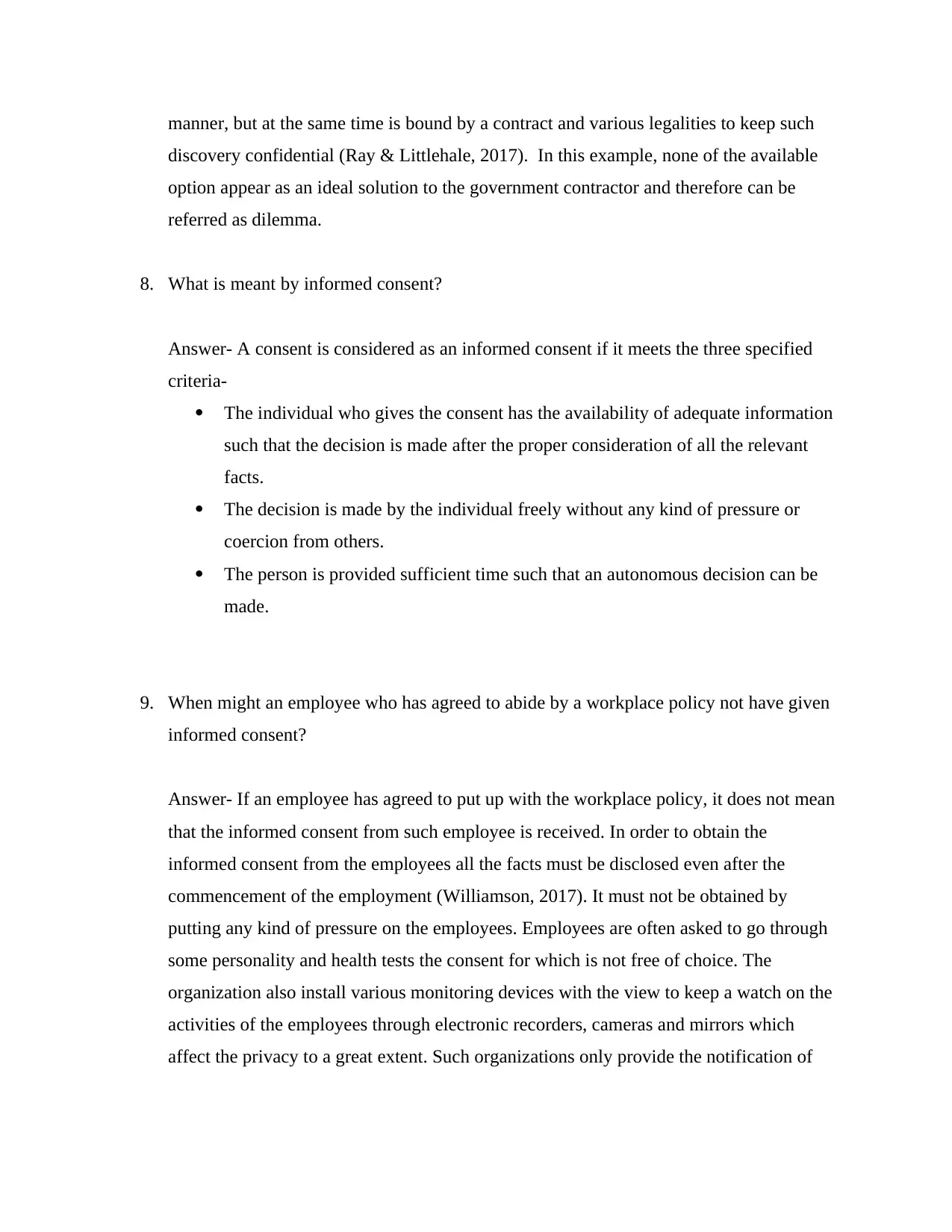
manner, but at the same time is bound by a contract and various legalities to keep such
discovery confidential (Ray & Littlehale, 2017). In this example, none of the available
option appear as an ideal solution to the government contractor and therefore can be
referred as dilemma.
8. What is meant by informed consent?
Answer- A consent is considered as an informed consent if it meets the three specified
criteria-
The individual who gives the consent has the availability of adequate information
such that the decision is made after the proper consideration of all the relevant
facts.
The decision is made by the individual freely without any kind of pressure or
coercion from others.
The person is provided sufficient time such that an autonomous decision can be
made.
9. When might an employee who has agreed to abide by a workplace policy not have given
informed consent?
Answer- If an employee has agreed to put up with the workplace policy, it does not mean
that the informed consent from such employee is received. In order to obtain the
informed consent from the employees all the facts must be disclosed even after the
commencement of the employment (Williamson, 2017). It must not be obtained by
putting any kind of pressure on the employees. Employees are often asked to go through
some personality and health tests the consent for which is not free of choice. The
organization also install various monitoring devices with the view to keep a watch on the
activities of the employees through electronic recorders, cameras and mirrors which
affect the privacy to a great extent. Such organizations only provide the notification of
discovery confidential (Ray & Littlehale, 2017). In this example, none of the available
option appear as an ideal solution to the government contractor and therefore can be
referred as dilemma.
8. What is meant by informed consent?
Answer- A consent is considered as an informed consent if it meets the three specified
criteria-
The individual who gives the consent has the availability of adequate information
such that the decision is made after the proper consideration of all the relevant
facts.
The decision is made by the individual freely without any kind of pressure or
coercion from others.
The person is provided sufficient time such that an autonomous decision can be
made.
9. When might an employee who has agreed to abide by a workplace policy not have given
informed consent?
Answer- If an employee has agreed to put up with the workplace policy, it does not mean
that the informed consent from such employee is received. In order to obtain the
informed consent from the employees all the facts must be disclosed even after the
commencement of the employment (Williamson, 2017). It must not be obtained by
putting any kind of pressure on the employees. Employees are often asked to go through
some personality and health tests the consent for which is not free of choice. The
organization also install various monitoring devices with the view to keep a watch on the
activities of the employees through electronic recorders, cameras and mirrors which
affect the privacy to a great extent. Such organizations only provide the notification of
Paraphrase This Document
Need a fresh take? Get an instant paraphrase of this document with our AI Paraphraser
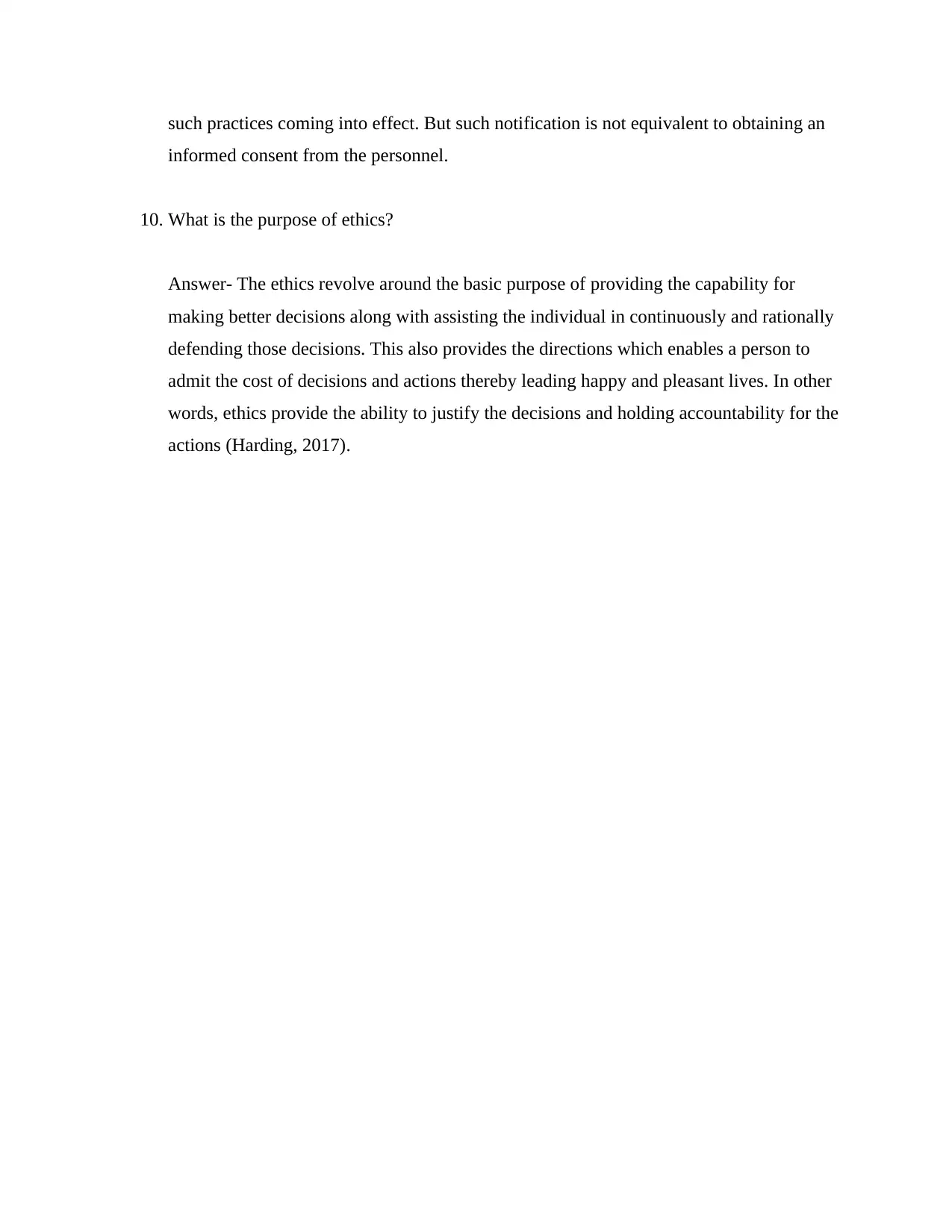
such practices coming into effect. But such notification is not equivalent to obtaining an
informed consent from the personnel.
10. What is the purpose of ethics?
Answer- The ethics revolve around the basic purpose of providing the capability for
making better decisions along with assisting the individual in continuously and rationally
defending those decisions. This also provides the directions which enables a person to
admit the cost of decisions and actions thereby leading happy and pleasant lives. In other
words, ethics provide the ability to justify the decisions and holding accountability for the
actions (Harding, 2017).
informed consent from the personnel.
10. What is the purpose of ethics?
Answer- The ethics revolve around the basic purpose of providing the capability for
making better decisions along with assisting the individual in continuously and rationally
defending those decisions. This also provides the directions which enables a person to
admit the cost of decisions and actions thereby leading happy and pleasant lives. In other
words, ethics provide the ability to justify the decisions and holding accountability for the
actions (Harding, 2017).
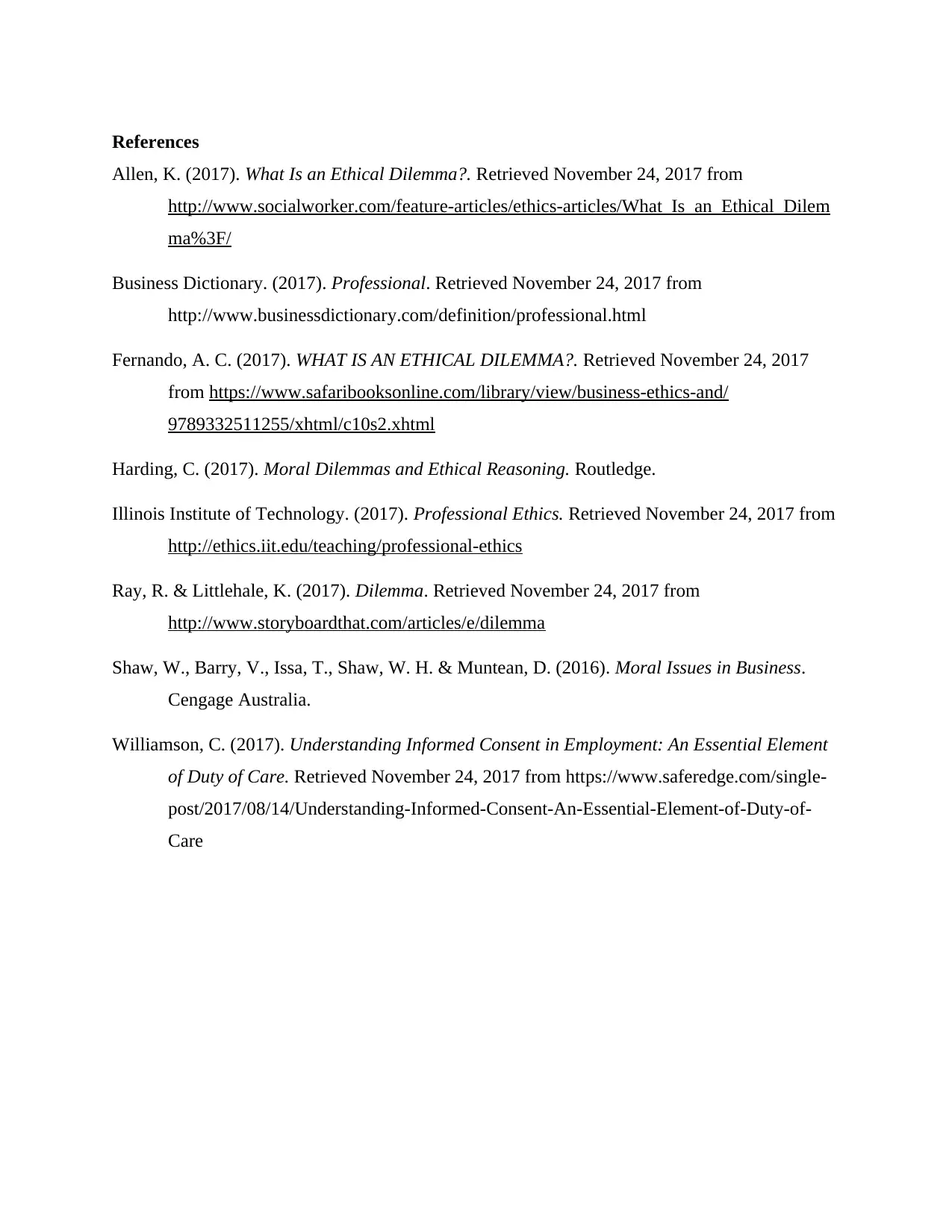
References
Allen, K. (2017). What Is an Ethical Dilemma?. Retrieved November 24, 2017 from
http://www.socialworker.com/feature-articles/ethics-articles/What_Is_an_Ethical_Dilem
ma%3F/
Business Dictionary. (2017). Professional. Retrieved November 24, 2017 from
http://www.businessdictionary.com/definition/professional.html
Fernando, A. C. (2017). WHAT IS AN ETHICAL DILEMMA?. Retrieved November 24, 2017
from https://www.safaribooksonline.com/library/view/business-ethics-and/
9789332511255/xhtml/c10s2.xhtml
Harding, C. (2017). Moral Dilemmas and Ethical Reasoning. Routledge.
Illinois Institute of Technology. (2017). Professional Ethics. Retrieved November 24, 2017 from
http://ethics.iit.edu/teaching/professional-ethics
Ray, R. & Littlehale, K. (2017). Dilemma. Retrieved November 24, 2017 from
http://www.storyboardthat.com/articles/e/dilemma
Shaw, W., Barry, V., Issa, T., Shaw, W. H. & Muntean, D. (2016). Moral Issues in Business.
Cengage Australia.
Williamson, C. (2017). Understanding Informed Consent in Employment: An Essential Element
of Duty of Care. Retrieved November 24, 2017 from https://www.saferedge.com/single-
post/2017/08/14/Understanding-Informed-Consent-An-Essential-Element-of-Duty-of-
Care
Allen, K. (2017). What Is an Ethical Dilemma?. Retrieved November 24, 2017 from
http://www.socialworker.com/feature-articles/ethics-articles/What_Is_an_Ethical_Dilem
ma%3F/
Business Dictionary. (2017). Professional. Retrieved November 24, 2017 from
http://www.businessdictionary.com/definition/professional.html
Fernando, A. C. (2017). WHAT IS AN ETHICAL DILEMMA?. Retrieved November 24, 2017
from https://www.safaribooksonline.com/library/view/business-ethics-and/
9789332511255/xhtml/c10s2.xhtml
Harding, C. (2017). Moral Dilemmas and Ethical Reasoning. Routledge.
Illinois Institute of Technology. (2017). Professional Ethics. Retrieved November 24, 2017 from
http://ethics.iit.edu/teaching/professional-ethics
Ray, R. & Littlehale, K. (2017). Dilemma. Retrieved November 24, 2017 from
http://www.storyboardthat.com/articles/e/dilemma
Shaw, W., Barry, V., Issa, T., Shaw, W. H. & Muntean, D. (2016). Moral Issues in Business.
Cengage Australia.
Williamson, C. (2017). Understanding Informed Consent in Employment: An Essential Element
of Duty of Care. Retrieved November 24, 2017 from https://www.saferedge.com/single-
post/2017/08/14/Understanding-Informed-Consent-An-Essential-Element-of-Duty-of-
Care
⊘ This is a preview!⊘
Do you want full access?
Subscribe today to unlock all pages.

Trusted by 1+ million students worldwide
1 out of 6
Related Documents
Your All-in-One AI-Powered Toolkit for Academic Success.
+13062052269
info@desklib.com
Available 24*7 on WhatsApp / Email
![[object Object]](/_next/static/media/star-bottom.7253800d.svg)
Unlock your academic potential
Copyright © 2020–2026 A2Z Services. All Rights Reserved. Developed and managed by ZUCOL.





